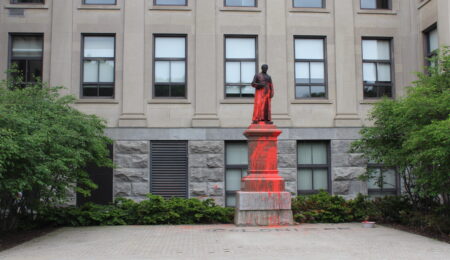COUNCILLORS WOULD NOT GET TO VOTE ON LEIPER’S ORIGINAL MOTION AFTER MESSY PROCEDURE
On Wednesday’s city council meeting, councillors were set to vote on councillor for Kitchissippi Jeff Leiper’s motion to restore O-Train Line 1 service back to every five minutes between 9 a.m. and 3 p.m. At least, that’s what they thought.
The council had been debating Leiper’s motion for about two hours and it was nearing a vote. But at 1:30 p.m., councillor for Stittsville Glen Gower introduced a substitute motion that called for a review of ridership levels and system efficiency that would be returned to the Transit Commission within three months.
Councillor for Somerset Ariel Troster urged those in favour of Leiper’s motion to vote no on Gower’s motion to ensure that the original proposal could be voted upon, but council ultimately voted 14-10 — with one abstention — to put Gower’s motion to a vote, superseding the original motion.
Just as it seemed that off-peak service restoration — which came with an estimated cost of $600,000 dollars this year and $1.6 million annually — was dead in the water, councillor for Knoxdale-Merivale Sean Devine accepted councillor for Beacon Hill-Cyrville Tim Tierney’s compromise to amend Gower’s motion and get service restoration back on the table.
Devine had floated a proposal to put an amendment forth which would see LRT service return to the five-minute interval in the interim while waiting for the ridership and efficiency review, which he agreed to modify to a seven-minute interval to satisfy Tierney.
Leiper, Devine, and Troster were joined by councillor for Rideau-Vanier Stéphanie Plante, Theresa Kavanagh, Laine Johnson, Jessica Bradley, Rawlson King and Shawn Menard on one side of the issue. Riley Brockington, who seemingly abstained on the first vote in protest, made the group strongly in favour of the original motion 10.
Tierney made 11, and in a council made up of 25, the bloc needed two more votes. Councillor for Alta Vista Marty Carr would ultimately swing as well, acknowledging that she “really struggled” with the vote,” noting she had only received a handful of emails complaining about the Aug. 26 reduction in service compared to a large number complaining about OC Transpo’s ‘New Ways to Bus’ service cuts.
But ultimately, that was all the support the new amendment would garner. The motion to restore service during ‘off-peak’ hours to every seven minutes was voted down 13-12.
Leiper’s Motion
“The decision to reduce capacity by way of reducing frequency, will absolutely save $1.6 million per year,” Leiper told the Fulcrum. “The effect of that, however, goes beyond capacity considerations,” noting that reduced LRT frequency means that riders are more challenged to make their connection buses.
Leiper noted that University of Ottawa Students’ Union president Delphine Robitaille had made the assertation that some U of O students were having to wait at the U of O’s station because the trains that were arriving were full.
“The solution to that is greater frequency,” contended Leiper. “Trains are going to come along that are full, but when you have appropriate frequency, then the wait is minimized, and it has less of an impact on people’s overall journey.”
Leiper also acknowledged that for many, transit is not a choice. “I think that’s what some of us are finding so distressing about discussions of cuts to service or fare hikes, is that with the way the system is now — with many people who have alternatives availing themselves of them — the people who are left on the system are more frequently the people who have no choice [of alternatives], and that strikes many of us as profoundly unfair.”
The councillor for Kitchissippi also mentioned how even students who live in wards not served by Line 1 have a “real stake” in ensuring the train runs, because they depend so heavily on transfer buses.
“A lot of that will be eased with stage two. Those transfers will be easier. The bus routes will be shorter to get to LRT. But right now, a significant number of students live in wards that are not directly served by LRT.”
Devine’s Amendment
“Reliability and frequency are the key motivators to use public transit,” contended Devine. “By diminishing frequency, we are diminishing reliability, and we lose reliability; we lose riders.”
Devine also spoke to the Fulcrum after the meeting. “Any rationale that suggests that even at diminished frequency there is still capacity is ignoring the fact that you will increase ridership – and therefore increase demand on that capacity – by improving reliability and frequency.”
The councillor for Knoxdale-Merivale also talked about his concern with the timing of the reduction in service, noting that it came before waiting to see what difference the return of university students and federal employees would mean for the system.
“I appreciate that OC Transpo wants to make a data-based decision, but this diminished level of service will likely result in fewer riders. If we want LRT to succeed, then we should assess ridership under optimal conditions, rather than under diminished conditions. Let’s set ourselves up for success.”
Other Councilliors for Leiper’s Original Motion
Plante noted that she had never received so much correspondence, especially not from such a wide spectrum of residents, recalling specific conversations she has had with her constituents, including Robitaille. “I want these people to know that we’re listening to them, we hear their concerns.”
“The consequences are being felt by those who have fewer options in front of them,” said Johnson, deputy mayor and councillor for the city’s College ward, who also brought up the concern of reputational risk. “We hear from residents every day who do feel that they are losing faith in OC Transpo.”
King, deputy mayor and councillor for Rideau-Rockcliffe, called upon the city to invest in core services and infrastructure. “We need to have the courage to make difficult decisions now for the long term benefit of the city.”
Menard, councillor for Capital Ward and former president of the Carleton University Students Association, argued that the cuts came with no long-term analysis and will affect people’s live negatively. “It’s an arbitrary cut … you cut all the transit in Ottawa and you’ll have financial savings,” before pointing out that the city should be doing more to entice riders to come back.
Bradley, councillor for Gloucester-Southgate, agreed with part of mayor Mark Sutcliffe’s rebuttal that the city has invested in transit. “We have invested in transit … but we are not making investments we need [operationally] … if we don’t apply the correct amount of operational funding to make that service useful and attractive for our residents, we’re just left with shiny trains. Shiny, parked, trains.”
Troster called the service cuts “the transit death spiral in action,” noting that this will inevitably lead riders to miss their connector busses as well. “This is a small amount of money … in our giant transit deficit … people are just going to give up, if they haven’t already.”
Brockington, councillor for River, also made the distinction between frequency and capacity. ‘We told people this would not just be a rapid service, but a frequent service.”
Councillors Against Leiper’s Original Motion
There was a clear divide between inner-city councillors and outer-city councillors on the issue of LRT service.
Even councillors like Wilson Lo (Barrhaven East), Catherine Kitts (Orléans South-Navan), Matthew Luloff (Orléans East-Cumberland) and David Hill (Barrhaven West) who spoke about the congestion issues on busses in their wards were not as amicable to train riders — even though some of those bus riders presumably transfer to the LRT at some point heading to or from downtown.
Other outer-city politicians didn’t mince as many words. “Five minutes is not worth $1.6 million dollars, in my opinion,” argued councillor for Kanata North Cathy Curry. Curry then asked councillors “is there no other way you would want to spend $1.6 million dollars?”
“I don’t think Ottawa’s transit problem should be rural Ottawa’s problem,” said councillor for Rideau-Jock David Brown, arguing that his ward shouldn’t pay for things they don’t use.
Kitts acknowledged that the service cut was “not ideal optics” for OC Transpo, but that five-minute intervals are not a necessity for users.
Sutcliffe contended that OC Transpo staff should make decisions about service levels, not councillors. “I think we should support our staff by allowing them to make this decision.”






